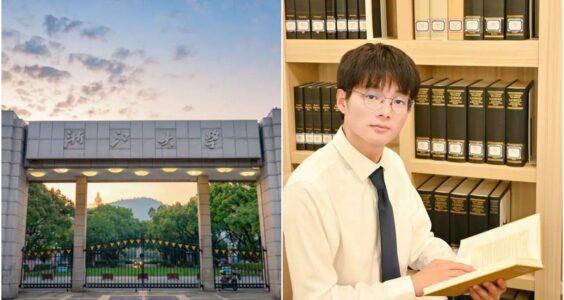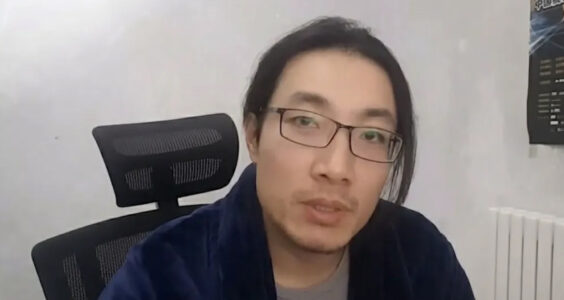
这是一个关于勇气、逃亡和荒诞悖论的故事。
2020年10月,中国河南青年关恒独自驾车深入新疆,用长焦镜头记录下那些隐藏在荒野、城镇和军营背后的集中营设施。为了让这些影像公之于众,他开始一场惊心动魄的逃亡:辗转南美,最终独自驾驶一艘小船,在海上漂泊23个小时,从巴哈马成功登陆美国佛罗里达。2021年抵达美国后,他按计划发布了视频。这些素材,成为国际社会(包括BuzzFeed News的普利策获奖团队)证实中国在新疆行径的关键证据。
曾经以为自己安全了的关恒,四年后却在美国失去自由。2025年8月,在美国移民与海关执法局(ICE)针对关恒合租室友的突袭中,关恒因“非法入境”在纽约上州被拘捕。如今,他身处纽约州布鲁姆县监狱(Broome County Correctional Facility),面临着被遣返的危险——被迫回到那个他不惜一切代价逃离的中国。
2025年8月21日早晨,纽约上州一处住宅区,关恒的房门被一阵剧烈的敲门声惊醒,是ICE的探员。
他们并不是来抓他的。他们的执法目标是关恒的室友——一对在当地做店铺转让生意的夫妻,他们因为和别人有经济纠纷,而遭人举报。但此时,当ICE的探员拿着搜查令冲进屋子时,38岁的关恒正好被“撞见”,随即也被抓走。现场对话如下:
探员:“你当时是怎么入境的?”
关恒:“自己开船从海上过来的。”
探员:“你有I-94表格(入境记录)吗?”
关恒:“没有。”
关恒先是被带到ICE办公室,随后被送进奥尔巴尼附近的县监狱,关了一天;又被转移到布法罗的移民拘留中心,关了近一周;最后,他被送到了现在的关押地——布鲁姆县监狱。
“他们根本不关心我有没有工卡,也不关心我的庇护案件是什么状态。”2025年10月,在接受“中国人权”电话采访的时候,关恒的声音充满了困惑和沮丧。“他们只关心我的入境方式。只说我没有通过正常海关入境,这个行为本身就是非法的。”
他那个正在等待面试排期的庇护申请、那张合法的工卡、那本纽约州驾照……在ICE面前,因“未被海关检查入境” (Entry Without Inspection) 这一事实,而显得一文不值。
伴随着川普当局严查非法移民,布鲁姆县监狱人满为患。几个月过去了,关恒在焦虑与沮丧中等待着自己的案件结果。没有人知道,这个来自中国的年轻人,曾经在过去的几年经历了什么;也没有人知道,他曾经冒着巨大风险拍摄的新疆集中营影像,为中国当局在新疆队维吾尔族人的所作所为提供了重要的佐证。而如果一旦被遣返,他将面临多么巨大的危险。
1 “ 我想去新疆实地看看,到底是怎么回事”
关恒的家在河南南阳,出生于1987年11月。
据关恒和他的母亲讲述,因父母离异,关恒从小在祖母的照料下长大,祖母去世后,他一直一个人独自生活。在2021年7月离开中国前,他从事过许多不同工作——开过快餐店、在采油厂工作过几年,后来一直是自由职业。据他讲,事实上他很早就学会了“翻墙”。
与许多中国年轻人不同,关恒的“翻墙”之旅并未停留在电影和音乐等娱乐活动上。通过互联网,他触及了那些被官方叙事掩埋的“禁区”:从1960年代的大饥荒到1989年的天安门事件。这些来自外部世界的真实信息,对他的思想造成了很大冲击,一条巨大的裂痕在他心中被凿开了。
“我一点一点地了解,最后发现,原来中国政府隐藏了这么多不可告人的秘密。”2025年11月,在本文作者拨通监狱电话对关恒的一次采访中,他如是回忆。他说,大约是在大学毕业之后,他已成了一个沉默的异见者,一个生活在体制下,思想却早已“越狱”的人。
2019年,关恒以一名探险游客的身份,骑着摩托车从上海一路穿越到新疆。他本以为这是一场风光之旅,却撞上了一堵高压管控的无形之墙。
“那种感觉太明显了。”他说,“一进入新疆,就有大量的检查站,到处都是警察和武警。连住宾馆都要反复登记,还要做人脸识别。”在加油站,他甚至因骑着摩托车而受到严格限制。这次新疆之旅,让他亲眼见证了中国政府在新疆严酷的社会管理系统,但那时他对此依然知之不深。
2020年,新冠疫情爆发,关恒和数亿中国人一样被封控在家。在百无聊赖的一次上网中,他点开了一篇来自著名的美国网络媒体BuzzFeed News (BFN) 的报道。报道用卫星地图和数据,揭示了一个庞大的、遍布新疆的集中营网络。

图为BuzzFeed News新疆系列报道之一,发布于2020年8月27日
这一刻,他在2019年新疆之旅中的疑惑有了答案。他意识到,他在新疆看到的那些检查站、警察和人脸识别系统,实际上也是这一套庞大社会监控系统的外围。
“凭我对中国政府的了解,他们太喜欢掩盖那些不想让人看到的东西了。”关恒说,“这件事勾起了我巨大的兴趣,尤其是我去过新疆却对此一无所知。我当时就特别想再去一次,去实地看一看到底是怎么回事。”
他很清楚,一个普通人以游客身份去做这件事,无异于“送死”。“我完全预料到了风险。”他语气平静。他开始像策划一场秘密行动一样做准备:他没有使用自己的专业设备,而是在网上租了一台长焦DV摄像机,以便在安全距离外拍摄。
他准备了两张SD卡。一张卡拍完后,立刻藏在车里一个隐蔽的角落;另一张无关紧要的空卡则插回DV里。“我怕万一被盘查。”他说,“至少他们不知道我拍了什么。”
2020年10月,关恒独自驾车驶向了那个他一年前去过的是非之地——新疆。
2 “漫游”新疆三天 逐一核实卫星坐标中的监禁设施
关恒的行程不是一次漫无目的的旅行,而是一场按图索骥的“解谜”。那张“地图”,就是BuzzFeed News (BFN) 报道中标记的怀疑是“拘留营”的卫星坐标。
他花了整整三天时间,在新疆的广阔土地上,逐一核实那些被标为灰色(低度可疑)、黄色(中度可疑)和红色(高度可疑)的坐标点。
关恒的第一个观察地点是哈密市。在到哈密市之前,他先去了一个叫“北村”的地方,那里有一个灰色标记(低度可疑)。那是个粉色的房子,没有铁丝网之类的,看起来也没什么人,不像是监禁设施。
之后,他开车进入哈密市区,找到了一个黄色标记,挂的牌子是“哈密市强制隔离戒毒所”。它位于闹市区,车水马龙,这让关恒产生了怀疑,“在闹市区的戒毒所,是拘留营的可能性并不高。”但紧接着,他找到了另一个黄色标记——“新疆生产建设兵团第十三师看守所”。
这个地方立刻让他绷紧了神经。它藏在一条小胡同的尽头,不仅看守所本身高墙林立,连紧挨着它的好几个院落,都同样用高墙和铁丝网围着,完全不是普通的家属院。这与报道中集中营的特征高度吻合。
为了掩护自己,关恒在离开时,特意在胡同口的商店买了点零食,并且“故意”用微信扫码付款。“万一被盘问,”他事后解释,“我至少有个理由说我为什么会出现在那条死胡同。”
第二天,关恒一直在公路上奔波。他途经三个县:木垒、吉木萨尔、阜康。他发现BFN的许多标记,最终都指向了各地现有的“看守所”或“拘留所”——木垒县看守所、吉木萨尔县拘留所、阜康市拘留所。在木垒县,他找到了两个灰色标记的“农牧民培训学校”和“职业教育中心”。虽然建筑看似已经废弃,但院墙上依然保留的铁丝网,像是在诉说着它们曾经的用途。
这一天的行程让他意识到,这场运动的规模,远比他想象的要大——当局不仅在建造新的设施,也在利用、改造和扩建所有现存的关押系统。
不过,这也是比较棘手的一点,因为哨塔和铁丝网等警戒设施本就是拘留所的一部分,单凭设施外观特征,很难判断其是否被作为关押维吾尔人的集中营所使用。
第三天,关恒开车经过了三座城市乌鲁木齐、达坂城、库尔勒。这是他此行收获最大,也最惊险的一天。
在乌鲁木齐郊区,他根据坐标找到了“乌鲁木齐市第二教育矫治局(戒毒所)”。他把车停远,假装成晨练的路人,用GoPro边走边拍。他不仅拍到了这个戒毒所,还在它周围发现了三个同样戒备森严的院落。在一个设施门口,他拍到了一辆正在卸货的蔬菜运输车——这是设施正在运作的证据。
紧接着,在附近一条名叫“高科路”的地方,他有了此行最关键的发现。路的一侧,是绵延不绝的巨大设施群,高墙、哨塔一应俱全,但在任何地图上都没有标识。关恒用长焦DV拉近镜头,成功拍到了建筑物顶部醒目的红色大字:“劳动改造,文化改造”。
当天下午,他前往达坂城。这是一个“红色标记”,藏在远离公路的荒野深处,连碎石路都没有。关恒把车停在水塘边,独自爬上一个高高的土坡。
“我当时除了紧张,还是紧张。”他回忆道。他趴在土坡上,镜头里是一个崭新、巨大、但似乎尚未启用的建筑设施。他拍完匆匆下山,才惊出一身冷汗——他发现自己爬的那个山坡顶上,居然有座房子,而他停车的水塘边,不知何时多了一个钓鱼的人。
他强作镇定,主动走上前去搭讪:“师傅,钓什么呢?”在确认对方没有注意到自己的可疑行为后,他才开车飞速离开。
最后一站是距离乌鲁木齐339公里的库尔勒。在这里,关恒要寻找的坐标指向了一个军营(门口有坦克)的背后。那是一个规模庞大、戒备森严的设施,唯一的入口,就是穿过军营。
当关恒试图把车开下路肩、靠近拍摄时,军营旁一个店铺里的人走了出来,一直死死地盯着他。
在被对峙的紧张气氛中,关恒急中生智。他猛踩油门,驾驶着底盘很高的SUV,在荒地里“漂移”、转圈,故意做出“测试车子性能”的玩车姿态。那个“店主”似乎被这个疯疯癫癫的司机搞糊涂了,看了一会儿,便无趣地回了屋。
就在对方转身的瞬间,关恒停稳车,拿出了他的长焦DV,拍摄下了他视频中的最后一幕。

关恒所拍摄视频中的一个片段
3 海上漂流一天一夜 从巴哈马偷渡至美
影片制作完成了。关恒拥有了这颗“数字炸弹”,但他很快意识到一个致命的问题:他无法在不炸毁自己的前提下,按下那个“发布”键。
“我知道,影片做完没关系,可一旦发到网上,他们(警察)肯定会找到我。”关恒在采访中说。“如果我被控制了,这些影片要么发不出去,要么就会被删除,我的人身也会受到威胁。”
他能想到的唯一办法,是先离开中国。
但这颗炸弹的引信,被拉得无比漫长。自2020年疫情爆发后,中国国境一直封锁。关恒无处可去,只能抱着这些素材,在压抑和焦虑中等待。直到2021年夏天,窗口终于打开。7月4日,他从蛇口离境,后从香港出发,飞往了当时对中国护照免签的南美洲国家厄瓜多尔。
他在厄瓜多尔停留了两个多月,只为了一件事:打辉瑞疫苗。他无法信任中国的国产疫苗,但当时国内的疫苗政策正变得越来越严厉,“不打疫苗,健康码就是红码,寸步难行。”
打完两针疫苗,他飞往了另一个免签国——巴哈马。这里,距离他的最终目的地仅有一水之隔。他本想从中国代购一条船寄过来省钱,但巴哈马的签证转瞬即逝——他记忆中只有14天——物流却迟迟未到。2021年10月,他等不及了,只能在当地的海洋用品店,花掉了身上仅存的近3000美元,买下了一条小充气船和一个外挂发动机。然后在巴哈马的Freeport(自由港)下海,方向是美国的佛罗里达州。他从谷歌地图看到,海上直线距离大约是85英里。
据关恒讲述,他没有任何航海经验,不会划船,甚至严重晕船。这次出海,是他人生中第一次“开船”。他唯一的依仗,是一个机械指南针和一部存有GPS地图的手机。
“我当时在海上漂了将近23个小时。”他回忆说。他带了很多食物和水,但因为极度紧张,“全程只喝了一罐可乐”。这场旅程最大的威胁不是风浪,而是他那个简陋的发动机。
“我当时手头钱不多,没有买封闭式油箱,”他说,“只能拎着油壶,在晃动得非常厉害的船上,一次次地直接往发动机里灌油。”汽油洒得到处都是,整个小船弥漫着浓烈的汽油味,随时可能因一个火星而引爆。
“那艘船变成了一个漂浮的炸弹。”关恒说,“当时我确实有点后怕,因为一旦起火,我就不可能出现在美国了。”
他本计划在晚上登陆,以避人耳目。但在无尽的漂泊中,他唯一的念头就是“快点到达”。
第二天清晨,他远远看到了佛罗里达的海岸线。9点左右,小船靠岸。沙滩上已经有了早起散步的游客,其中一对老夫妻正向他这边走来。关恒的心提到了嗓子眼,他害怕这对夫妻报警。
他顾不上那条船,也顾不上船上散落的行李,背着自己最重要的背包,在小船冲上浅滩的瞬间,一跃而下,冲向岸边的灌木丛中。他躲在灌木丛里,大口喘气。过了一会儿,他看到一艘海岸警卫队的巡逻艇在近海驶过。但他已经安全了。
就这样,经过偷渡,关恒抵达了他向往的“自由世界”。
4 视频震撼网络 而他和家人付出了巨大代价
据关恒说,在巴哈马下海之前,他就已设置好了所拍视频的发布时间。“我当时并不知道自己能不能安全到美国。”他说,“我不能等到抵达后再发。” 关于新疆集中营的视频,在2021年10月5日,终于通过他的Youtube频道公之于众。
视频发布后立即引发了巨大反响。作为当时极为罕见的、来自中国公民的第一视角实地影像,关恒拍摄的视频迅速被德国之声、自由亚洲电台等媒体报道和引用。更重要的是,它为BuzzFeed News (BFN) 的普利策获奖团队提供了关键的实地佐证。BFN的记者在接受德国之声和自由亚洲电台采访时,特别强调了关恒这份素材的非凡价值,他们赞美了拍摄者的勇气,并表示视频中的新信息证实了他们对新疆正在发生的事情的看法。
于此同时,作为这枚信息炸弹的“引爆者”,关恒本人则承受着超出他预期的巨大压力——一波来自中国国安和网络外宣的、针对他个人的巨大攻击立即在网上开启。
就在他发布视频后不久,一个名叫“理科男士K一米”的Youtube博主,发布了一个“人肉”视频,将关恒所有的个人信息——包括真实姓名、生日、毕业院校、家庭住址——扒得一干二净。这个叫“理科男士K一米”的博主,日常所发内容,基本是亲共立场。
“他们把关恒‘人肉’了。”2025年11月1日,在接受“中国人权”采访时,关恒的母亲罗女士说。她的声音因愤怒而有点颤抖,“当时下面的留言骂得非常难听,说关恒是汉奸,还说‘让他在美国最好被黑人兄弟给误杀’。”
与此同时,一场针对他YouTube频道的“围剿”开始了。关恒在采访中回忆:“他们先是以‘暴露隐私’(视频中拍到一名警卫)为由举报,YouTube就把我的视频下架了。”
他被迫申诉,并使用YouTube自带的工具,给那个画面打了马赛克。视频恢复上架后,对方发现这招有效,便开始“疯狂举报”他的所有视频。关恒的后台瞬间被海量的“违规通知”淹没。
这场精准的、由国家机器发动的“人肉”网暴和系统的技术围剿,在心理上击垮了关恒。
“我当时的心理压力非常大。”关恒回忆,“我基本上就不再关注了,主动不去看这些事情。”疯狂的网暴让他陷入了严重的抑郁。为了保护自己,他主动切断了和外界信息的联系。也正因如此,他甚至在这次被抓之前,都不知道自己所发布的视频在国际社会产生了怎样巨大的反响。他只知道自己在被官方有组织地“人肉”,他害怕了。
他躲了起来。但风暴的真正中心,却在他的故乡河南南阳炸开了。
据关恒和他的妈妈罗女士讲述,就在关恒的视频发布一个多月后,2022年1月,一场由国安主导的、针对他所有亲属的系统性“连坐”开始了。
“我从台湾回去(2023年底)的时候,他们(家人)每个人都非常紧张。”罗女士说,“很担心我会在机场就被扣起来,因为他们已经有过被传讯的经历了。”
据罗女士讲,她在河南老家以及省会郑州的四个姐妹,几乎在同一时间被当地国安分别传唤。“警察最后交代她们,”罗女士说,“如果有关恒的任何消息,要及时汇报。假如知情不报的话,后果你知道吧。”
2022年1月底,四个警察将关恒的父亲从家中带走,进行了一场从中午持续到晚上9点的审讯。警察当场收走了他的手机,拿去南阳市局“恢复资料”。当晚,警察又押着他父亲,前往关恒出国前居住的奶奶家,将他留在中国的电脑主机搜走,并开具了“扣押清单”。过了一个多月(2022年3月),国安再次提审了他的父亲。
国安人员还找到了关恒从小关系最亲密的姑姑。他们将关恒的姑姑和姑父分别带走,分开审讯。这场心理战彻底摧毁了关恒的姑姑。 “她(姑姑)吓得现在晚上都睡不着觉。”罗女士说,“她后来直接跟他(关恒父亲)说了一句很撕破脸的话:‘请你们不要再为关恒的事情来找我了!我们家人还要在这边生活,我怕影响到我的小孩,怕牵连到他们!请你们不要再来骚扰我了!’”
关恒当时并不知道这一切。当他以为自己只是一个人在纽约孤独地消化网暴的创伤时,他远在中国的整个家族,已经被国安彻底地“梳理”和“威慑”了一遍。
就这样,带着一身的创伤和对故土的彻底决裂,关恒在美国独自生活了三年。直到2025年的夏天,命运以一种更荒诞的方式,将他推入了另一个牢笼。
5 从一个牢笼到另一个牢笼
在美国的三年多里,关恒一直试图在孤独中重建生活。2021年10月25日,他在纽约递交了庇护申请,随即拿到了工卡,买了辆二手车,先是在纽约市靠开Uber和送外卖维生。后来,他转行去做了长途卡车司机,“因为做卡车司机天天住车上,就不需要住处了。”当他辞去卡车司机的工作后,他决定搬离纽约市。
“我特别喜欢上州的森林公园。”他说。为了寻求一个更安静、能亲近自然的环境,2025年春天,他从纽约市搬到了奥尔巴尼附近的一个小镇。
他只是一个房客。他合租的房子里,住着一对来自中国的夫妻,他们是这栋房子的“二房东”。平静的生活持续到2025年这个清晨,ICE执法人员剧烈的敲门声,打破了这份平静。
在ICE的抓捕现场,关恒出示了自己的工卡和有关庇护的文件等来证明身份,但看起来,在ICE——隶属于国土安全部(DHS)的执法逻辑中,关恒在纽约移民局(USCIS)的身份似乎无关紧要。
仅仅因为是从海上入境这一点,就作为“非法移民”被逮捕的关恒,先是被带到ICE办公室,随后被送进奥尔巴尼附近的县监狱,关了一天;又被转移到布法罗的移民拘留中心,关了近一周;最后,他被送到了现在的关押地——布鲁姆县监狱。
起初,他被关押在移民监区。“那里还好。”他说,“跟其他国家的移民关在一起,大家都是同类人,有共同话题,可以一起打球、打牌,很热闹。”
但一个月后,他被转到了一个只有美国籍犯人(American inmates)的监区——据他所说,其中很多是性犯罪者。
他再次陷入了彻底的孤岛状态。“跟他们就没什么可聊的了。”在电话中,他情绪低落地说,“大厅里的空气很差,我待久了会一直咳嗽,所以大部分时间,我只能一个人待在院子里或者我自己的房间里。”
正是在这种极致的孤独中,他开始反思自己的人生。
“在这里面,我遇见一位狱友,她也是移民。”关恒说,“她对我说了一句话,对我影响很深。她说:‘两个人总是要好过一个人。’”
这句话击中了他。“我当时就在想,”他反思道,“如果我有家人或朋友陪伴,我可能就不会搬去上州,也就不会被抓。如果身边有个伴,我的心态也会好很多。”
他意识到,那个让他得以完成新疆壮举的“孤勇”特质,也正是他此刻的阿喀琉斯之踵。
“在之前,我一直觉得我是一个孤独的战士,所有问题都要自己解决。”他说。“但当我真的进了监狱才发现,哪怕个人能力再强,我什么都做不了。我只能完全依赖外界对我的帮助。”
如今的他,开始意识到,必须走出过去刻意独来独往的心理状态,依靠美国的公民社会和人权组织,来阻止美国的执法机构,将他遣返回那个他曾冒死揭露黑幕、一旦遣返后果将不堪设想的中国。
6 跨越铁窗的营救 以及“我做的是正确的事”
就在关恒被关押在布鲁姆县监狱、面临被遣返的巨大风险时,多份证言信送到了他的律师手中。这些信件揭示了一个关恒自己都未曾知晓的事实:他孤身冒险拍摄的素材,已成为了国际社会关注中国新疆人权危机的重要拼图。
第一份信件,来自那个曾激励他出发的起点。当年启发关恒前往新疆的BuzzFeed News普利策获奖记者团队(Megha Rajagopalan, Alison Killing, Christo Buschek),在得知关恒的处境后,联名写了一封对关恒的支持信。他们在信中确认,正是关恒提供的“地面实证(Ground Truth)”,填补了他们卫星影像分析中缺失的最后一块拼图。
“关先生在巨大的风险下,为我们的调查提供了关键的佐证。他的勇气非同寻常…… 他没有任何其它合理理由会出现在许多这些拘押地点附近,因为它们通常位于偏远地区……若被抓获,他面临的危险将大幅增加。”BFN团队在信中写道。他们特别指出,关恒提供的证据帮助证实了达坂城新监狱的存在——这直接戳穿了中国政府声称“再教育营已关闭”的谎言。
联名信最后提到:“我们相信,如果关先生被遣返回中国,他将面临巨大的危险。因此,我们呼吁美国向关先生提供庇护,并终止对他的拘押以及对其被遣返的威胁。”
第二份信件,来自纪录片《杂音和噪音》(All Static & Noise)的制片人英杰 (Janice M. Englehart)。
关恒的镜头被收录在这部反映维吾尔人生存状况的纪录片中,该片曾在新西兰、澳大利亚、日本和英国放映,用以揭露中国政府的虐待行为。
Janice在支持信中说到:“关先生冒着自身及家人的安全风险,提供了重要的视频证据,这些证据与卫星影像相互印证,确认了中国政府在新疆维吾尔自治区运营的集中营的存在……
他在2020年的努力,为研究人员、记者和纪录片制作人提供了支持,使他们能够自信地理解和传播中国新疆这一对许多西方记者、外交官和访客来说长期不可接近地区正在发生的情况。”
在信的结尾,Janice直言:“关先生的行为完全符合美国国家利益。”她警告称,如果关恒被遣返,极可能因“间谍”或“勾结外国势力”的指控而面临酷刑甚至死亡。

《杂音和噪音》纪录片封面
另一份支持关恒的证言和信件,来自中国人权执行主任周锋锁,他表示,早在2021年11月17日,关恒抵达美国仅仅几天后,他就在推特上注意到了这个年轻人,并主动联系了他。“我当时就认为他是一个凭着良心做事的人,”周锋锁回忆道。但他同时也敏锐地察觉到了关恒身上的创伤,“他很低调,甚至有些躲闪,即便到了美国,依然生活在某种‘躲藏’之中。”
周锋锁指出,“这(维族议题)对汉人是一个高压红线,如果他被遣返,因为这个事件所造成的社会影响,他肯定会面临非常严重的刑期。”更重要的是,周锋锁认为关恒的遭遇揭示了当下许多寻求自由者的共同处境:“他们向往自由、逃离暴政,却生活在多重的恐惧之中。” 周锋锁在证言中写道,“一方面要躲避被抓进美国移民监狱,另一方面又要躲避来自中共的跨国镇压。”
这正是关恒过去三年的真实写照——在“双重恐惧”的夹缝中生存,直到被其中一方捕获。
“美国是一个热爱自由的人所建立起来的国家。”周锋锁最后呼吁,“一个热爱自由、反抗暴政且为此付出巨大代价的人,应该能够留下,应该是属于这个国家的。”
与此同时,世界维吾尔代表大会执行委员会主席茹仙·阿巴斯(Rushan Abbas)和知名维吾尔诗人阿不都外力·阿尤普(Abduweli Ayup)也纷纷站出来,声援这位曾为他们民族发声的汉人。

2021年11月中国人权执行主任周锋锁和关恒的合影
“被遣返回去的话,他真的就死定了。” 2025年11月10日,关恒的母亲罗女士在采访中颤抖地说。罗女士如今身在台湾,她对儿子的处境十分担忧,目前她最大的心愿是美国法庭能做出公正裁决,阻止ICE的遣返程序,让她的儿子留在美国。这样他至少是安全的。
罗女士的恐惧并非空穴来风,类似的悲剧早已上演。毕业于美国阿默斯特学院的青年学者冯斯瑜就是前车之鉴。她曾于2017年在新疆大学民俗研究中心访学,与该中心主任、知名人类学家热依拉·达吾提合作研究维吾尔族民俗文化。然而,热依拉·达吾提于2017年12月被抓,并在次年被判处无期徒刑;冯斯瑜也在2018年突遭拘捕,最终被重判15年。
如今,来自普利策得主、电影制片人、维吾尔领袖和人权活动家的努力,正试图构建一道“保护墙”,阻挡ICE的遣返程序,以保护关恒,并让他重获自由。
2025年10月20日,在纽约州的监狱里,身穿囚服的关恒,正在等待着12月的移民听证会。当本文作者接通他的电话,告诉他,他冒死拍摄的视频是普利策获奖报道的关键佐证时,他听起来颇为讶异。
他说自己并不为自己曾经做过的事情后悔。经历了这一切,他反而更加认为,自己所做的事情是“正确”的。
“正因为我现在切身感受到了失去自由的滋味,我更能体会到那些身处集中营中的人们的感受。” 他在监狱的电话中说,“我现在需要外界的帮助,他们同样也需要。所以,我仍然认为我当时做了正确的事情。”
“我觉得这是中国政府正在犯下的一项巨大的、不受任何监管和控制的罪恶。” 他补充道,“它给无数家庭造成了分别和失去自由的痛苦。所以,即便是现在,我依然坚定地反对中国政府在新疆所做的一切。”
但作为一个已经失去自由的“非法移民”,他如今唯一的希望,只有来自外界的律师、记者和人权组织的紧急救援。
12月15日,关恒的庇护申请案件就要在纽约开庭。他的命运悬而未决,取决于一个问题:这个他不惜一切代价奔赴的自由世界,最终会选择保护他,还是将他送回那个他曾冒死揭露黑幕、最终为了自由与正义而仓皇逃离的故乡?
![]()
![]()
![]()
![]()
![]()
![]()


















